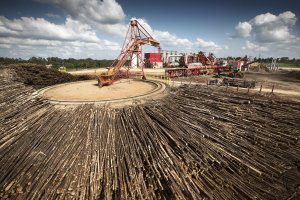
The reconstruction of the Odesa-Reni road (M-15) will be completed in 2018, Ukrainian President Petro Poroshenko has said.
“I am confident that next year we will complete the construction and repair of the last 90 kilometers of the road and get the road to Romania and a large transport corridor that will give a second wind to settlements, towns and villages that are located along the road. Business, tourism, economy, and production will be developed,” he said at a meeting with residents of the village of Mayaky, Biliaivka district, Odesa region, on Thursday.
He noted that this result had been achieved due to the realization of the so-called “road experiment,” according to which 50% of the funds received from over-fulfilment of the plan for regional customs receipts are used for the repair of roads in a respective region.
At the same time, Poroshenko noted a great role of the regional authorities in the reconstruction of the Odesa-Reni road.
As reported, in September 2015, Poroshenko signed law No. 666-VIII on amendments to Section IV “Final and Transitional Provisions” of the Budget Code of Ukraine regarding conducting an experiment in Odesa, Volyn, Lviv and Chernivtsi regions for the financial support for reconstruction, repairs of public roads of national importance. The legislative initiative is designed to ensure financing for the reconstruction of a number of highways, including the Odesa-Reni road.
A total of 50% of over-target monthly indicative customs payments collected for customs clearance of goods in Odesa, Volyn and Lviv regions has been earmarked for use under the law.
In December 2016, the Verkhovna Rada expanded to all regions of Ukraine the experiment on financial support for the reconstruction and repairs of public roads of state significance at the expense of part of customs payments.

The European Bank for Reconstruction and Development (EBRD) will issue a EUR9 million loan as part of the Public Sector Energy Efficiency Financing Framework (PSEEF) program to Kremenchuk (Poltava region) with the population of approximately 220,000 people.
According to a press release of the EBRD, the funds will be provided to the city’s municipal enterprise Kremenchuk Municipal Energy Service Company and will help achieve annual energy savings of 19.5 GWh (or EUR1.3 million in monetary terms) in 66 buildings across the city.
“The EBRD is providing a financing package of EUR9 million, which will consist of the bank’s long-term loan of up to EUR6 million, a EUR1.5 million concessional loan from the Clean Technology Fund (CTF) and a EUR1.5 million grant from the EBRD Shareholder Special Fund (SSF),” the document reads.
According to the report, the municipality of Kremenchuk was the first in Ukraine to receive funds under the PSEEF program approved by the EBRD on December 13, 2017. In general, the program consists of EUR100 million of EBRD financing and EUR15 million of the concessional co-financing from the Clean Technology Fund.
The report says the city has over 120 public buildings, which consume twice as much energy compared to similar buildings in central Europe. The majority of them require thermal insulations, modernization of the energy distribution system, installation of individual heating substations, windows replacement and many other similar measures.
“Total investment needs of public buildings in Ukraine are estimated to be up to EUR5 billion. They can potentially offer a significant energy cost savings of up to 60%. The project will also be a good incentive for the construction industry and the employment in the region,” EBRD Director for Ukraine Sevki Acuner said.

Head of Odesa regional administration Maksym Stepanov and vice governor of the government of Jiangxi Province Xie Ru have signed a letter of intent to establish cooperation between Odesa region and the Chinese province.
“I know that agriculture is developing at a high level in Jiangxi. And you have interesting projects for processing agricultural products that we could jointly implement. I hope that our meeting will lead to a strong relationship between Odesa region and Jiangxi province,” the press service of the regional administration quoted Stepanov as saying following the meeting, which was held on Wednesday.
In turn, vice governor Xie Ru stressed that Ukraine and China should become strategic partners and noted the beauty and prospects of Odesa region.
“After the start of construction of the new Silk Road, our relations with Odesa region should deepen. Your region has access to the sea, beautiful nature and rich resources – this is very important,” said the vice governor of Jiangxi Province.
After finalizing the terms, the parties plan to develop cooperation in trade, construction of basic infrastructure, investment, science and technology, industry, agriculture, education and culture.

A guarantee agency can be created for lending to agricultural producers, First Deputy Minister of Agrarian Policy and Food Maksym Martyniuk told Interfax-Ukraine.
“We did not ask for this postponement [of the moratorium on the sale of agricultural land], but since lawmakers decided so, then in the next 12 months we will concentrate on the establishment of the State Agricultural Guarantee Agency – this is a working name,” he said.
According to him, the said structure can be a state financial institution that would act as a guarantor for loans that agrarians want to borrow.
“The agency’s charter capital can be formed at the expense of 1% of GDP allocated for the support of the agro-industrial complex. If we allow [farmers] to get loans and they will be cheap, I think this will remove the populist question: “Where does the farmer take money to buy land?” he added.
Ukraine’s parliament extended the moratorium on the sale of farmland until January 1, 2019.

Ukrainian Sawmills, a company with Swedish investment, on December 21 opened a first woodworking plant in Kostopil (Rivne region) to produce pine sawn timber for production of furniture, joinery and construction materials, the press service of Rivne Regional Administration has reported.
“We are launching the plant in Kostopil and finish the initial phase of our investment project. Ukrainian Sawmills is a high-tech production facility with a capacity of 300,000 cubic meters of products meeting European quality standards. We invested about EUR 25 million in this project and created 150 jobs in Kostopil,” the press service said, citing Swedish co-founder of the company Johan Dunbäck.
The plant was opened by Ukrainian Deputy Prime Minister and Minister for Regional Development, Construction, Housing and Utility Services Hennadiy Zubko, his Deputy Lev Partskhaladze and Head of Rivne Regional Administration Oleksiy Muliarenko.
According to the press release, the implementation of the project became possible after the introduction of a moratorium on the export of unprocessed wood in the country, which was a decisive factor for investors.
“The opening of this enterprise proves that Rivne region is interesting for investors and it is comfortable for them to work here. We will be able to abandon the primitive export of wood, but we will process it ourselves, creating new jobs, filling local budgets and developing the woodworking industry in the region,” Muliarenko said.

Insulin producer Indar plans to build a new workshop to produce active pharmaceutical ingredients (API) by the middle of 2019, Indar Board Chairperson Liubov Vyshnevska said at a press conference at Interfax-Ukraine on Thursday.
“We have switched to the design stage of construction of a new workshop for production of API. By the middle of 2019 we will complete this issue and will have new capacities with a significant increase in production of API, as well as production of our own three analogues of insulin,” she said.
Vyshnevska said that at present, the scientific division of the company has completed development of three strains of insulin analogues.
Commenting on the results of the company’s work in 2017, she said that Indar brought two sugar-reducing drugs to the market in tablets, began delivering its drugs to Mozambique and Cote d’Ivoire, and also won 100% of insulin shipments to Moldova and Tajikistan.
Indar was created under a resolution of the Cabinet of Ministers in 1997 under the aegis of Kyiv meat processing plant. The producer is on the list of state-owned companies of strategic importance for the economy and security of the state.
Indar is a member of the Association Manufacturers of Medications of Ukraine.